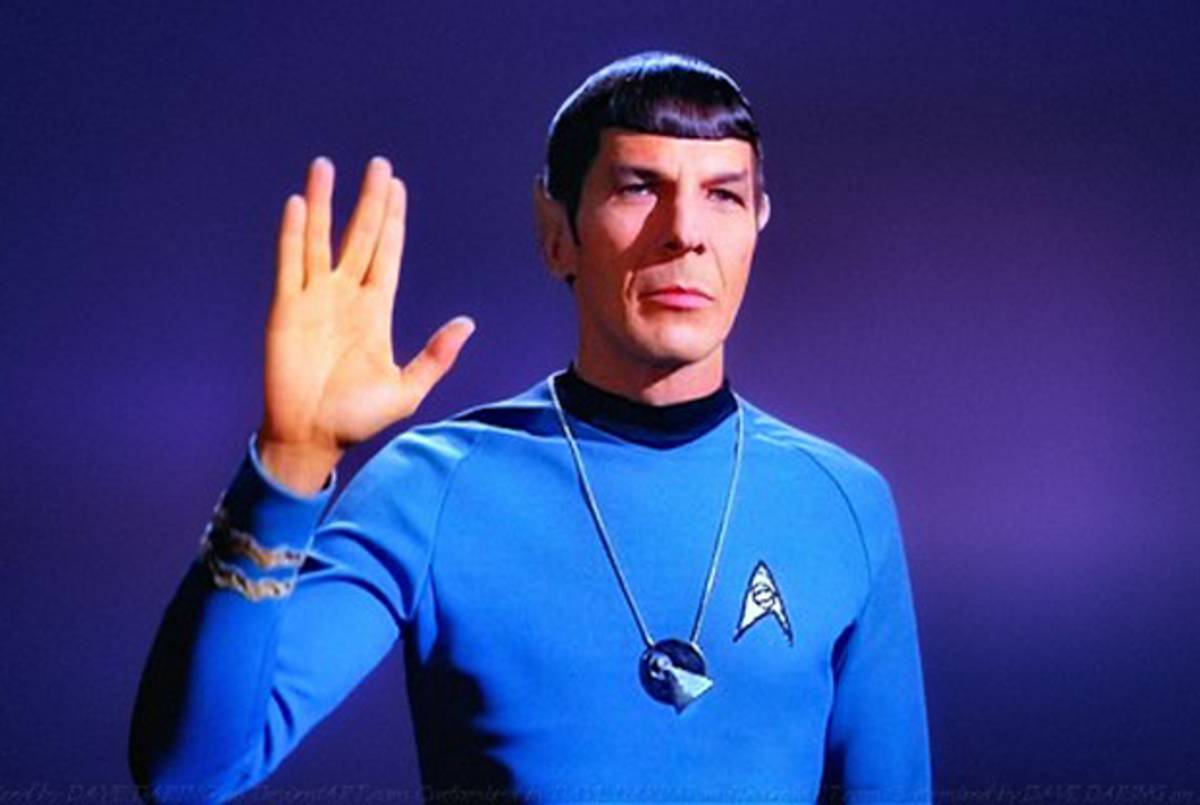
Much has been written since the passing of Leonard Nimoy about his embrace of Judaism, whether through the priestly blessings, provocative photographs, or Yiddish theater. All of that is true but incomplete. It is in his best known character, Mr. Spock, that Nimoy most fully resonated as a Jew. Consider the following:
He was an outsider looking in.
As the lone alien on the bridge of the Enterprise, Spock was ever the dispassionate observer and wry commentator on the foibles of humanity. “I find their illogic and foolish emotions a constant irritant,” he once remarked. Yet, despite this exasperation, he came to realize the essential role humans play in his life, expressing it best in his parting words to Kirk in The Wrath of Khan, “I have been and always shall be your friend.” Jews have wandered from country to country, culture to culture, becoming critics, and often trendsetters. Yet the Talmud also asks for a spirit of openness: If you are told that wisdom is to be found among the nations—believe it!
He struggled to balance intellect and emotion.
The heritage of Spock’s Vulcan father committed him to privilege logic above all else, but the emotional side of his human mother made the job impossible. He sacrificed his life to save the crew based upon the principle that “the needs of the many outweigh the needs of the few or the one.” Yet he was brought back to life because his emotional crewmates ignored that logic and risked everything to save him. Jews have engaged in the same struggle, with rationalists and kabbalists, Hasidim and Mitnagdim locked in a battle of the mind versus the heart. And even there the battle lines are not always clearly drawn. Rabbi Shneur Zalman of Liadi (1745-1812), trying to make Hasidic adherents in Mitnagdic territory, declared that “the mind must rule the heart.” And still the battle rages.
He exemplified the sacrifice of personal fulfillment for duty.
It takes an infection to teach Spock what happiness feels like. In the episode This Side of Paradise, he finds a colony whose members enjoy perfect contentment (and utter stagnation) as the result of being exposed to the spores of a local plant. When he is infected, Spock is able to smell the flowers and fall in love. But duty, in the form of Captain James T. Kirk, summons him back to self-denial and responsibility. Jews have always struggled to define these parameters. Does all leisure activity constitute the neglect of Torah study, as the more stringent would argue? What is a life well lived? The Talmud asks whether it is permissible to study Greek wisdom, given the obligation to “meditate upon Torah day and night,” and answers that one may only do so at a time which is neither day nor night.
His role spanned generations.
Of all the characters from the original Star Trek, Spock’s is the most recurrent in subsequent series and movies. It is through him that history is measured in the Trek universe. Even in the reset timeline that makes the later series of movies possible, Spock and Vulcan are the fulcrum. In the Jewish tradition, Jacob’s dream of the ladder with angels ascending and descending offers an apt counterpoint: Empires rise and fall and the Jewish people persist.
His awkwardness became his source of humor.
Spock’s otherness led to some of the funniest moments in the series. Often unaware of the laughter he is generating with a sincerely meant comment or a cocked eyebrow, Spock lets us laugh at him while still respecting him. It is a brand of humor not unlike one of the staples of the borsht belt: the greenhorn’s attempt to penetrate high society.
Purim is the holiday of letting loose, when restraints and self-control are relaxed, and “hidden” emotions are given play. “One must imbibe on Purim until he does not know the difference between Cursed is Haman and Blessed is Mordechai.” Some would equate Purim with “Festival” in the episode Return of the Archons, the day in the calendar of a regimented society when all rules of law and morality were suspended. Is Purim the safety valve in the generally serious Jewish calendar? Is it the time that Spocks are allowed to use spores without guilt?
I prefer a different Star Trek metaphor. Purim is the day that we reunite the disparate aspects of ourselves bifurcated by transporter and spiritual accidents. It is the day when we acknowledge both our physical and spiritual selves and the need for both. It is the holiday when we dare to say that even in the throes of the Evil Inclination, we are not such terrible people, and we are capable of great good.
Moshe Rosenberg is Rav of Congregation Etz Chaim of Kew Gardens Hills and teaches at the SAR Academy, where he integrates Tech and Torah. His book is Morality for Muggles: Ethics in the Bible and the World of Harry Potter (Ktav, 2011).
Previous: A Family Says Goodbye to Leonard Nimoy
Leonard Nimoy on Spock, Yiddish Theater, and the Vulcan Symbol’s Jewish Inspiration
Moshe Rosenberg serves as Rav of Congregation Etz Chaim of Kew Gardens Hills and teaches Judaic Studies at the SAR Academy in New York. He is the author of Morality for Muggles: Ethics in the Bible and the World of Harry Potter and The Unofficial Hogwarts Haggadah.